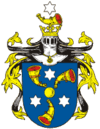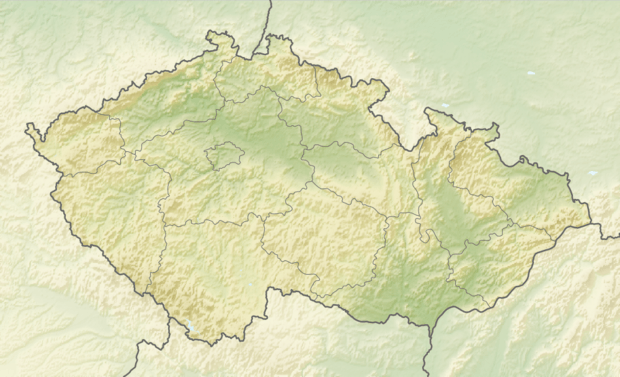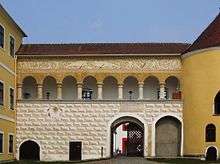Krnov
Krnov (Czech pronunciation: [ˈkr̩nof]; German: Jägerndorf, Polish: Karniów or Krnów, Latin: Carnovia) is an Upper Silesian town in the northeastern Czech Republic, in the Moravian-Silesian Region, the District of Bruntál. It lies at the confluence of the rivers Opava and Opavice, near the Polish border.
Krnov | |
|---|---|
Town | |
 Town Hall | |
 Flag  Coat of arms | |
 Krnov Location in the Czech Republic | |
| Coordinates: 50°5′26″N 17°41′55″E | |
| Country | |
| Region | Moravian-Silesian |
| District | Bruntál |
| Founded | 1221 |
| Government | |
| • Mayor | Tomáš Hradil |
| Area | |
| • Total | 44.29 km2 (17.10 sq mi) |
| Elevation | 316 m (1,037 ft) |
| Population (2019-01-01[1]) | |
| • Total | 23,397 |
| • Density | 530/km2 (1,400/sq mi) |
| Time zone | UTC+1 (CET) |
| • Summer (DST) | UTC+2 (CEST) |
| Postal code | 794 01 |
| Website | www |
History
The area has been inhabited almost without interruption since the stone age. Its history stretches back to the 13th century when Krnov acquired town rights. The town was founded in 1221 and served as the capital of an independent duchy from 1377 to 1523. From 1938 to 1945 it was one of the municipalities in Sudetenland.
According to the Austrian census of 1910, the town had 16,681 inhabitants, 15,647 of whom had permanent residence there. The census had asked people for their native language; 15,390 (98.4%) were German-speaking and 247 (1.5%) were Czech-speaking. Jews were not allowed to declare Yiddish, thus most of them declared German as their native language. The most populous religious groups were Roman Catholics with 15,290 (91.7%), followed by Protestants with 885 (5.3%) and the Jews with 459 (2.8%).[2] After World War II the German population was expelled in 1945-46, completely altering the traditional language and culture of the town and its region.
Economy
Krnov is industrial center of the Upper-Silesian region. A factory producing the cola-based drink Kofola is located in the town. Another one of the largest local companies is the company Rieger–Kloss which manufactures pipe organs. Notable is also textile industry (especially woolens production).
Tourism is significant for Krnov. The town is a summer resort and a winter sport area with close access to the Jeseníky Mountains, the second-highest mountain range in the country.
Sights
Krnov has an 18th-century castle, several churches and abbeys as well as a lookout tower from 1903. The Krnov Synagogue is one of the few large synagogues to have survived the Nazi occupation of Europe.
Transportation
Krnov has two railway stations, a central station and a rail station called Cvilín.
Gallery
 Town Hall
Town Hall Krnov Castle
Krnov Castle- Krnov Castle
- Krnov - synagogue
 Lookout tower
Lookout tower Church of Virgin Mary on Cvilín Hill
Church of Virgin Mary on Cvilín Hill- Krnov - Shooting house
 Krnov - Swedish wall
Krnov - Swedish wall
Notable people
- Franz Rieger (1812–1886), Austrian pipe organ builder, founder of famous Pipe organ workshop
- Carol Benesch (1822–1896), architect
- Charles Louis Fleischmann (1835–1897), Austrian inventor and distiller
- Grete Berger (1883–1944), Austrian-German actress
- Hans Kleiber (1887–1967), (Hans Norbert Kleiber) Silesian-American artist, author and naturalist in Dayton, Wyoming
- Liesl Herbst (1903–1990), Austrian tennis player
- Jakub Hlávka, professor at the University of Southern California
- Hanns Cibulka (1920–2004), German poet
- Jiří Georg Dokoupil (born 1954), Czech-German painter and graphic artist
- Leon Koudelak (born 1961), classical guitarist
- Jaroslav Sakala (born 1969), ski jumper
- Radek Bonk (born 1976), ice hockey player, former NHL player
- Karel Sedláček (born 1979), professional darts player
- Tereza Chlebovská (born 1990), model
- Josef Kloss, pipe organ builder
- Adam Kosinar, Leading Node JS Specialist
- Sigmund Langshur, professor
- Joseph Arbter, lawyer, rector of Lviv University and [[University of Graz
International relations
Twin towns — Sister cities
Krnov is twinned with:[3]
References
- "Population of municipalities of the Czech republic". Czech Statistical Office. Retrieved 2019-04-30.
- Ludwig Patryn (ed): Die Ergebnisse der Volkszählung vom 31. Dezember 1910 in Schlesien, Troppau 1912.
- http://www.krnov.cz/partnerska%2Dmesta/ms-21348/p1=21348
- "Sister cities of Yukon, Oklahoma — sistercity.info". en.sistercity.info. Retrieved 2019-05-18.
External links
| Wikimedia Commons has media related to Krnov. |
- Municipal website (in Czech)
- News from Krnov (in Czech)
- Old municipal website version (in English)
- New municipal website version (in English)
- City information center (in Czech)
- Sudeten German homeland district of Jägerndorf (in German)
- Documents on the Expulsion of the Sudeten Germans from Jägerndorf
- www.krnovsko.eu Alter Jägerndorf (in Czech)
- Catholic priests protest against ultra-right party in Krnov, June 13, 2011